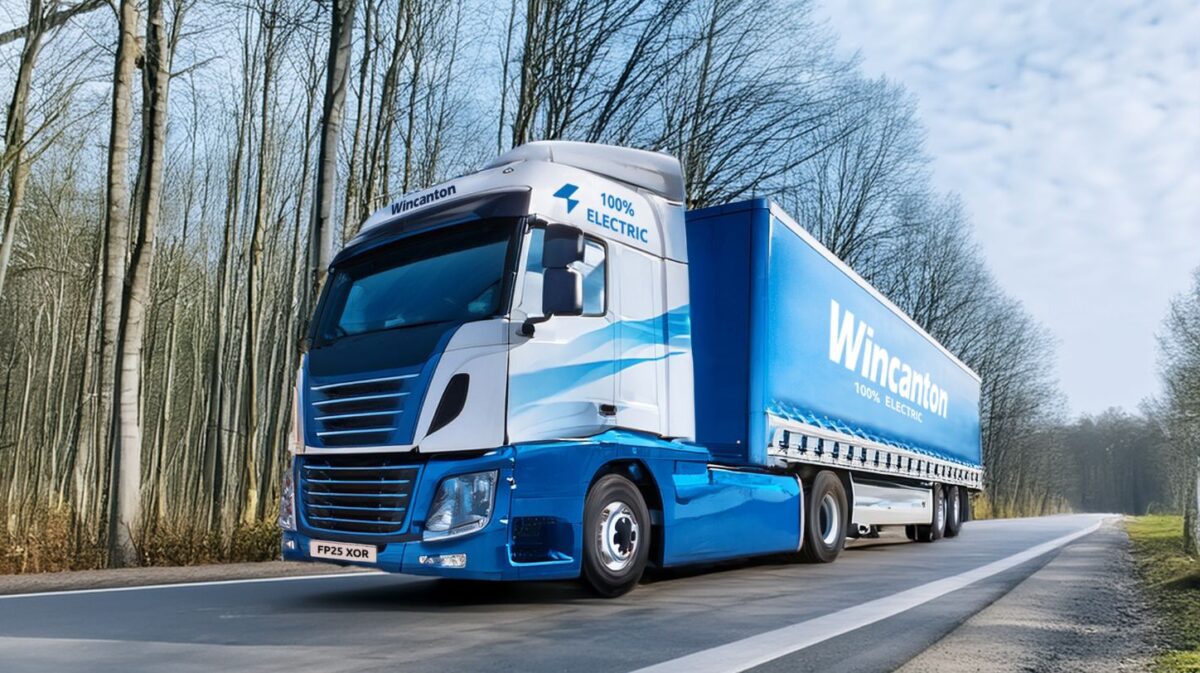Вступ
Очікується значна трансформація логістичного ландшафту, оскільки Wincanton готується ввести в експлуатацію 24 нових електричних вантажівки до кінця 2025 року. Це доповнення є частиною ширшої ініціативи, спрямованої на досягнення сталого функціонування та зменшення викидів вуглецю.
Ініціатива Wincanton щодо електричних вантажівок
Нещодавно компанія Wincanton повідомила, що перша з 24 електричних вантажівок вже доставлена, що є важливим кроком до модернізації її логістичного парку. Ці електричні транспортні засоби (eHGVs) з'являться на дорогах Великобританії цього літа, оскільки компанія прагне відійти від викопного палива та перейти до більш екологічних альтернатив.
Ця ініціатива є значною інвестицією Wincanton, що узгоджується з їхнім зобов'язанням досягти нульового рівня викидів вуглецю до 2040 року. Інтеграція електричних вантажівок не тільки підкреслює їхню відданість сталому розвитку, але й свідчить про зростаючу важливість екологічних логістичних рішень у сучасній промисловості.
Вплив на викиди вуглецю
24 нові електричні вантажівки, вироблені відомими брендами, такими як DAF Trucks, Volvo Trucks і Renault Trucks, розроблені для роботи з вантажем понад 40 тонн. Очікується, що ці транспортні засоби допоможуть Wincanton скоротити викиди вуглекислого газу на вражаючі 2400 тонн на рік. Це скорочення – не просто статистика; це важливий крок до трансформації екологічного сліду логістичного сектора.
Інсайти та плани на майбутнє
Компанія Wincanton готова отримати безцінні знання від цього проєкту електрифікації, сподіваючись використати ці дані для розробки стратегій декарбонізації свого автопарку в ще більшому масштабі. За словами Карла Хансона, керуючого директора з транспорту Wincanton, сталий розвиток є дороговказом для їхньої діяльності. Він зазначив: «Впроваджуючи нові автомобільні технології, ми скорочуємо викиди вуглецю та пропонуємо більш розумні та екологічні рішення для наших клієнтів».
Ця ініціатива підкреслює тенденцію в логістичній галузі до впровадження транспортних засобів з низьким рівнем викидів. Хоча широке впровадження електричних вантажівок може бути ще за кілька років, сучасні технології дозволяють компаніям підвищити ефективність і ефективно зменшити викиди.
Підтримуюча інфраструктура
Ключовим компонентом успіху розгортання eHGV компанією Wincanton є розвиток інфраструктури зарядки на базі депо, яка впроваджується в кількох місцях у Великій Британії, включаючи Лондон, Портбері, Глазго та Корбі. Ця інфраструктура має вирішальне значення для плавної інтеграції цих електромобілів у щоденні операції.
Wincanton співпрацює з Voltempo та Gridserve для розробки та впровадження цієї зарядної мережі, яка описується як необхідна для сталого функціонування автопарку. Такі інфраструктурні зусилля сприяють загальній меті компанії щодо впровадження екологічно чистих методів логістики.
Галузева співпраця та думки експертів
В рамках ширшого діалогу щодо транспорту з нульовим рівнем викидів, експерти Wincanton візьмуть участь у дискусії біля каміна на майбутній конференції Sustainable Supply Chain Conference у Лондоні, запланованій на 24 червня 2025 року. Ця конференція буде зосереджена на ролі цифрових технологій у досягненні цілей чистого нуля.
Саймон Баклі, менеджер з передачі знань про мобільність з нульовим рівнем викидів в Innovate UK, наголосив на важливості проєкту електричних вантажівок Wincanton. Він заявив: "Ми з нетерпінням чекаємо на реальні демонстрації та співпрацю в рамках проєкту Electric Freightway eFREIGHT 2030". Цей проєкт має на меті надати уявлення про майбутнє вантажних транспортних засобів з нульовим рівнем викидів, сприяючи досягненню амбітних цілей Великобританії щодо нульового рівня викидів.
Challenges and Opportunities Ahead
Незважаючи на багатообіцяючі досягнення в електричних вантажівках, залишаються проблеми в досягненні широкого поширення. Лідери галузі визнають, що, хоча автомобілі з низьким рівнем викидів представляють майбутнє логістики, перехід до повністю стійкої моделі вимагатиме часу та постійних технологічних удосконалень. Співпраця між учасниками галузі матиме вирішальне значення для подолання бар'єрів і розкриття потенціалу більш екологічних ланцюгів поставок.
Ініціатива Вінкантона є вагомим нагадуванням про те, що, хоча шлях до екологічно стійкої логістичної галузі може бути складним, значного прогресу можна досягти завдяки інноваціям та стратегічним інвестиціям у електричну мобільність.
Висновок
Підсумовуючи, додавання Wincanton 24 електричних вантажівок до свого логістичного парку є важливим кроком до більш сталого майбутнього в секторі логістики та транспортування. Потенціал для зменшення викидів вуглецю та покращення операційної ефективності узгоджується зі зростаючим попитом на екологічні рішення в галузі.
На платформах, таких як GetTransport.com, підприємства можуть вивчати ряд доступних глобальних рішень для вантажних перевезень, адаптованих до різних потреб, включаючи переїзди офісів, доставку вантажів і транспортування великих предметів. Ініціатива, вжита компанією Wincanton, є показовим прикладом того, як логістичний ландшафт розвивається для досягнення екологічних цілей, забезпечуючи при цьому надійні послуги. Отже, незалежно від того, чи хочете ви транспортувати громіздкі меблі, транспортні засоби, чи просто потребуєте надійну послугу перевезення, GetTransport.com спрощує логістику, надаючи різноманітні та економічно вигідні рішення. Забронюйте свою поїздку на GetTransport.com сьогодні!

 Wincanton розширює свій парк електромобілів новими е-вантажівками у 2025 році">
Wincanton розширює свій парк електромобілів новими е-вантажівками у 2025 році">